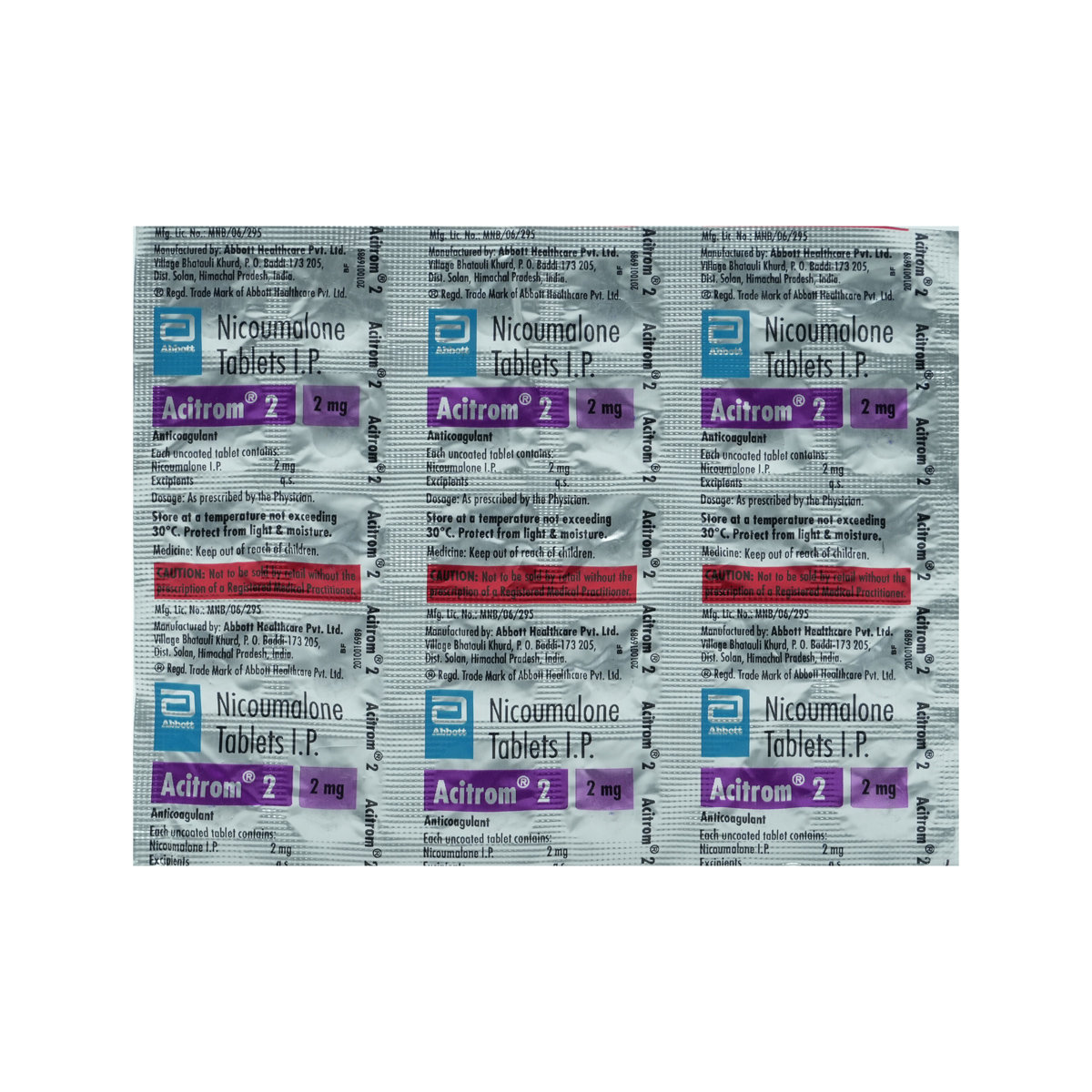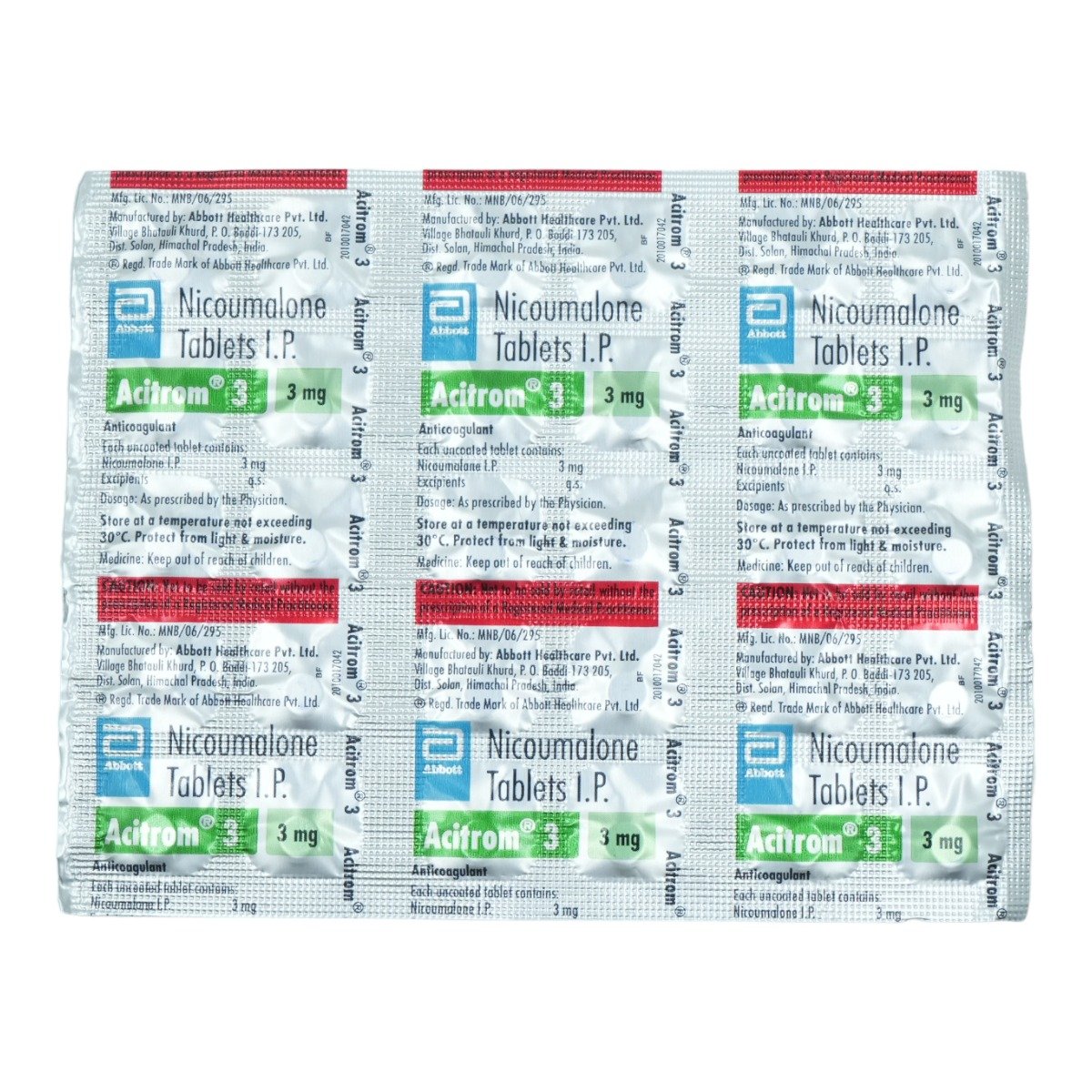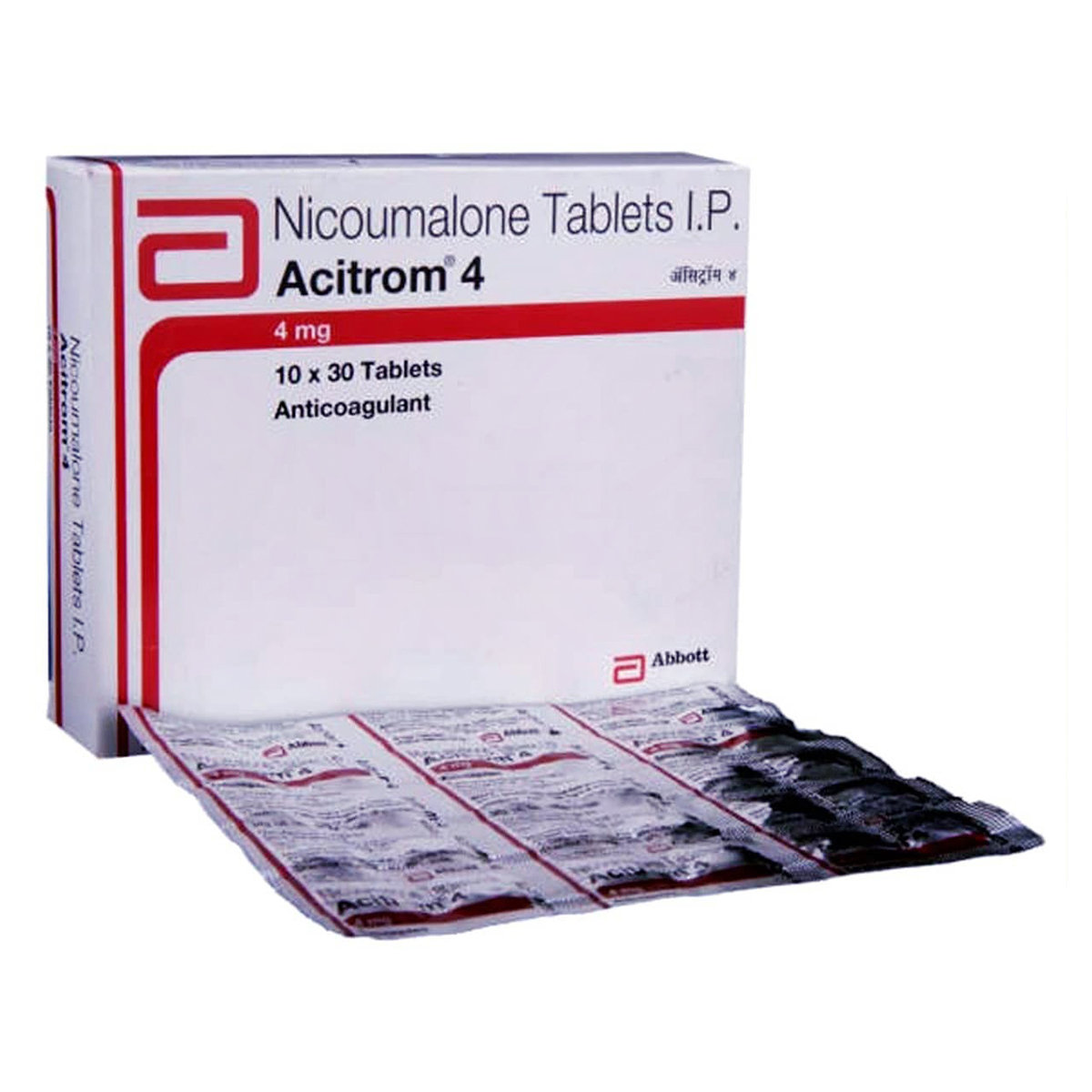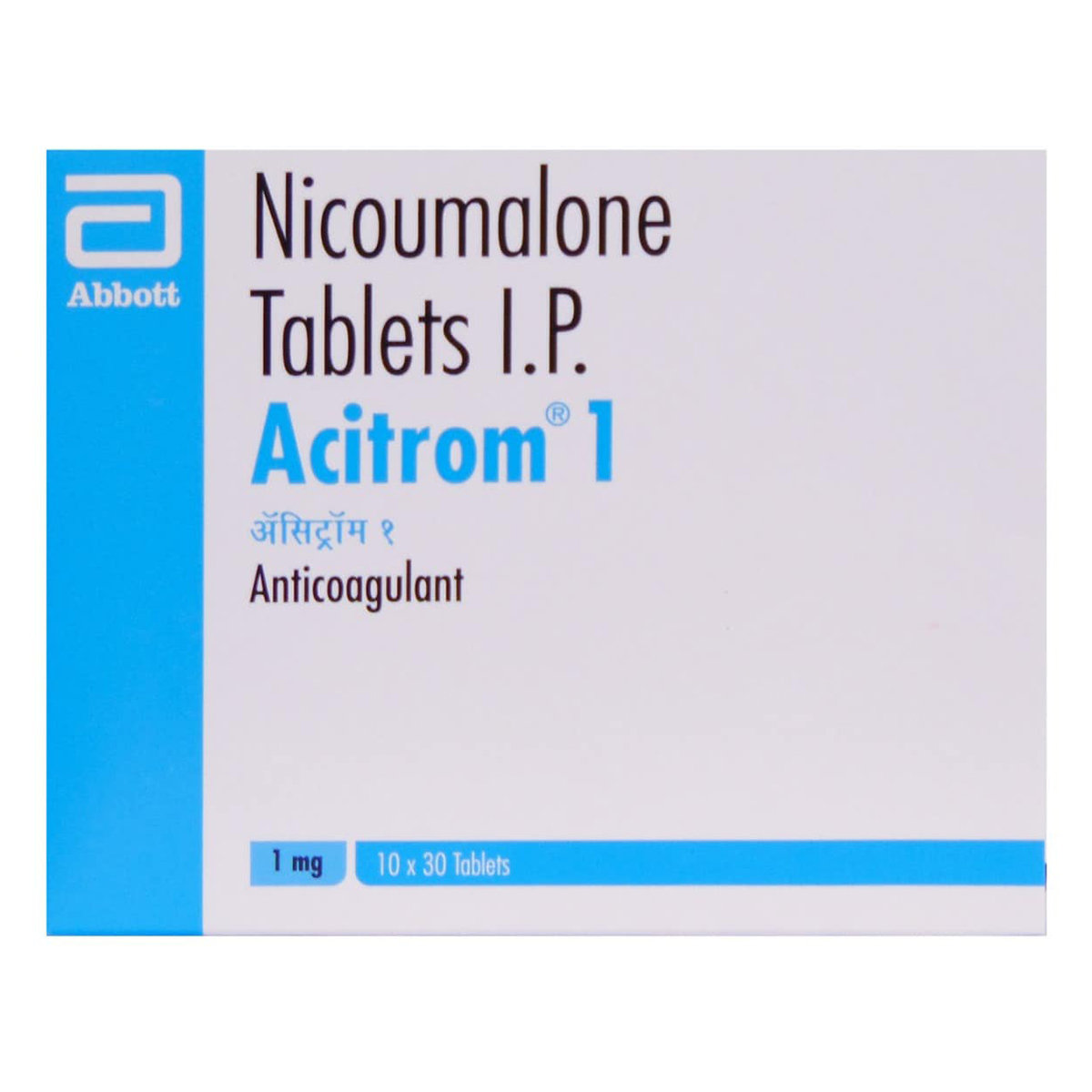Nicoumalone
About Nicoumalone
Nicoumalone belongs to a class of drugs known as anticoagulants or blood thinners. Nicoumalone is primarily used to prevent and treat various types of thromboembolic diseases (blood clots inside blood vessels), including deep vein thrombosis (blood clots in leg veins) and pulmonary embolism (blood clots in the lung). Deep vein thrombosis is a medical condition in which blood clots form in deep veins, usually in the legs. Pulmonary embolism is a condition in which a blood clot blocks the arteries in the lungs.
Nicoumalone is prescribed to prevent unwanted clots from forming if you have a condition that puts you at risk of this happening, such as atrial fibrillation, or if you have had a heart valve replacement. It is also given to prevent any clots that may have already formed in the blood vessels of your legs, lungs, or heart from becoming larger and causing problems. Nicoumalone works by increases the time it takes for your blood to clot, reducing the risk of a stroke or heart attack. This medication helps keep blood flowing smoothly in your body by decreasing the amount/number of clotting proteins in the blood. Nicoumalone does not dissolve blood clots that have already formed, but it may stop the clots from becoming larger and causing more serious problems.
Take Nicoumalone, preferably with or without food and swallow whole with a glass of water. Do not crush, chew or break it. Your doctor will advise you on how often you take your tablets based on your medical condition. Some people may experience unusual bleeding or skin rash. Most of these side effects of Nicoumalone do not require medical attention and gradually resolve over time. However, if the side effects persist or worsen, please consult your doctor.
If you are known to be allergic to Nicoumalone or any other medicines, please tell your doctor. If you are pregnant, trying for a baby, or breastfeeding, it is advised to consult a doctor before using Nicoumalone. If you have any cuts or wounds, stomach ulcers, kidney or liver problems, high blood pressure or bleeding problems, or if you are taking or using any other medicines. This includes any medications you are taking that are available to buy without a prescription and herbal and complementary therapies. Inform your doctor before taking Nicoumalone. It would help if you had frequent 'INR' (international normalized ratio) or prothrombin time tests to measure your blood-clotting time, as Nicoumalone prolongs bleeding time. You must be cautious while shaving and brushing your teeth to avoid too much bleeding from the injury site.
Uses of Nicoumalone
Medicinal Benefits
Nicoumalone is the popular drug of choice for oral anticoagulant therapy in many indications like calf deep vein thrombosis (blood clots in leg veins), proximal deep vein thrombosis (blood clots in a deep vein), pulmonary embolism (A condition in which one or more arteries in the lungs become blocked by a blood clot), recurrent venous thromboembolism (a blood clot forms most often in the deep veins of the leg, groin or arm), cardioversion, atrial fibrillation (An irregular, often rapid heart rate that commonly causes poor blood flow), antiphospholipid syndrome (A disorder in which the immune system mistakenly attacks normal proteins in the blood) and mechanical heart valves. Nicoumalone works by inhibiting the production of clotting factors by decreasing the action of vitamin K. This prevents the conversion of fibrinogen (soluble protein) to fibrin (insoluble protein), thereby preventing blood clot formation.
Directions for Use
Storage
Side Effects of Nicoumalone
- Unusual bleeding from the gums
- Heavy bleeding from cuts or wounds
- Unexplained bruising or nosebleeds
- Heavy periods
- Abdominal pain
- Blood vomiting
- Bloody or black tarry stools
- Blood in the urine
- Backache
- Dizziness
- Severe headache
- Weakness in an arm or leg
- Blurred vision
- A blood clot in the eye (visible pool of blood)
Drug Warnings
Indigestion medicines known as proton pump inhibitors like omeprazole should be used with caution while taking Nicoumalone. Prolonged use of Nicoumalone can cause bleeding problems (like nosebleeds, heavier periods, bleeding gums, and easy bruising). If you are going to have any surgery, discontinue taking Nicoumalone 5 days before the surgery. Discontinuation of Nicoumalone might increase the risk of heart attack, stroke, and other risks of cardiovascular events. So, do not stop taking Nicoumalone of a sudden on your own decision. If you have had any recent stroke or heart attack, stop the intake of Nicoumalone with painkillers like aspirin or ibuprofen as it can increase your stomach or gastrointestinal bleeding. Purpura (blood leakage under the skin) has been observed with the use of Nicoumalone including fatal cases. If you are pregnant or planning for pregnancy or a nursing mother tell tour doctor that you are taking Nicoumalone.
Drug Interactions
Drug-Drug Interaction: Nicoumalone may have interaction with other anticoagulants (e.g. heparin, dipyridamole, clopidogrel, ticlopidine), anti-arrhythmic agents (e.g. amiodarone, quinidine), antibiotics (e.g. clindamycin), a medicine used against pain (e.g. diacetylsalicylic acid, aminosalicylic acid, diflunisal), an antidepressant (e.g. citalopram), HIV protease inhibitors (e.g. ritonavir, nelfinavir), protease inhibitors (e.g. indinavir, nelfinavir, ritonavir, saquinavir), barbiturates (e.g. Phenobarbital), antacids (e.g. magnesium hydroxide), and proton pump inhibitors (e.g. omeprazole).
Drug-Food Interaction: You should avoid drinking cranberry juice or taking other cranberry products also Nicoumalone may interact with herbs and supplements, including include garlic, ginger, bilberry, danshen, piracetam, ginkgo biloba and St John’s wort plant (used as an antidepressant) and increase the risk of bleeding.
Drug-Disease Interaction: Nicoumalone should not be given to people with stomach ulcers, brain haemorrhage (bleeding in your brain), haemophilia (a bleeding disorder), and liver or kidney problems.
Drug-Drug Interactions Checker List:
Safety Advice

Alcohol
cautionYou are recommended to avoid the consumption of alcohol with Nicoumalone as it may increase the risk of bleeding.

Pregnancy
cautionNicoumalone is recommended not to use in pregnancy. Your doctor will discuss with you the potential risk of taking Nicoumalone during pregnancy. Please consult your doctor.

Breast Feeding
cautionNicoumalone should not be taken until prescribed. Your doctor will weigh the benefits and any potential risks before prescribing them to you. Please consult your doctor. You and your child may require blood tests if you are breastfeeding while you are taking Nicoumalone. However, as a precaution, your doctor may prescribe vitamin K to your child to prevent their blood from being thinned.

Driving
safe if prescribedNicoumalone has no or negligible influence on the ability to drive or use machines.

Liver
cautionTake Nicoumalone with caution, especially if you have a history of Liver diseases/conditions. The dose may be adjusted by your doctor as required.

Kidney
cautionTake Nicoumalone with caution, especially if you have a history of Kidney diseases/conditions. The dose may be adjusted by your doctor as required.

Children
cautionNicoumalone should not be taken until prescribed. Your doctor will weigh the benefits and any potential risks before prescribing it to you. If Nicoumalone is used in children or adolescents, blood should be tested more often, to see how well the medicine is working.
Habit Forming
Diet & Lifestyle Advise
- Low cholesterol diet along with a regular exercise regime is found to complement treatment with Nicoumalone effectively.
- As a precautionary measure, you are recommended not to consume alcohol, junk food items from outside, stick to a freshly prepared home-cooked meal, and take proper rest, for a speedy recovery.
- And also try to replace most of your saturated fats with unsaturated fats can reduce total cholesterol and LDL cholesterol in a short span of time.
- Foods like avocados, olive oil, fatty fish, and nuts contain lots of heart-healthy unsaturated fats, so it’s beneficial to eat them regularly.
- Option for foods that are high in vitamin K (liver, leafy green vegetables, or vegetable oils) as Nicoumalone may lower Vitamin K in your body.
- Avoid drinking alcohol as it increases the risk of gastrointestinal ulcer/bleeding.
- Cranberry juice, grapefruit juice, noni juice, and pomegranate juice may interact with Nicoumalone and lead to unwanted side effects. Hence try to avoid these juices while taking Nicoumalone.
Special Advise
- Caution and more frequent monitoring of platelet count, factor V assay, fibrinogen level test, prothrombin time test (PT or PT-INR), and the INR, or international normalized ratio to analyze your blood clotting time.
- You should NOT receive any injections into your muscles whilst you are taking Nicoumalone. If you need any injections into your spine or as part of a scan or X-ray test or if you need minor surgery, including dental surgery, make sure you discuss your treatment with your doctor first.
Patients Concern
Disease/Condition Glossary
Blood clots: Blood clots can occur in any part of the body, leading to a heart attack, stroke, and damage to organs (even coma or death). Blood clots can reach your arteries or veins in the organs like the brain, kidney, heart, lungs, and limbs. Conditions like atherosclerosis, diabetes, heart failure, irregular heartbeat (arrhythmia), and obesity/overweight can trigger excessive blood clotting in the brain and heart. On the other hand, deep vein thrombosis (blood clot in veins), peripheral artery disease (narrowed arteries due to fat deposit or blood clot), and atherosclerosis (fat built upon the walls of the arteries) can cause a blood clot in your limbs.
Deep vein thrombosis: Deep vein thrombosis (blood clots in the legs) is a medical condition in which blood clots form in deep veins, usually in the legs. The symptoms include leg pain or swelling.
Pulmonary embolism: Pulmonary embolism (blood clots in the lung) is a chronic condition that occurs as the blood clots break and travel to the lungs from deep veins in the legs or other parts of the body. The symptoms of pulmonary embolism include cough, chest pain, and shortness of breath.
FAQs
Yes, taking Nicoumalone can increase the risk of bleeding as it contains aspirin which blood thinner. So, please be very cautious while shaving, cutting fingernails or toenails, or using sharp objects to avoid any bleeding.
Yes, Nicoumalone causes blood thinning. It works by preventing platelets (a type of blood cells) from sticking together and forming clots.
Please consult your doctor if Nicoumalone needs to be stopped before undergoing surgery. The doctor might ask you to stop taking Nicoumalone a few days before surgery to avoid the increased risk of bleeding during the procedure.
Do not take aspirin for pain relief or ibuprofen while you are taking Nicoumalone unless your doctor says it's OK. They raise the risk of unusual bleeding.
When a blood clot is treated, guidelines recommend that patients take blood thinners for the rest of its life. If they do not, the chance of developing a second clot is 30 to 40 percent in the next ten years.
There might be a problem if you take herbal therapies with Nicoumalone, especially those that affect the blood, like Ginkgo Biloba and St John's wort plant extract used as an antidepressant. Together with taking it can increase your risk of bleeding. Tell your doctor if you are using any type of herbal supplement before taking Nicoumalone.
No, you are usually not advised to have a tattoo or body piercing while taking Nicoumalone as it may increase the risk of bleeding and infection. If you still wish to proceed further, contact your doctor so that the dose may be adjusted or any antibiotics may be prescribed, and let the piercer or tattooist know in advance that you are on treatment with a blood thinner.
No, you are not recommended to stop taking Nicoumalone without consulting your doctor, as it may worsen the condition. Therefore, take Nicoumalone for as long as your doctor has prescribed it.
You can have platelet count, factor V assay, fibrinogen level test, prothrombin time test (PT or PT-INR) and the INR, or international normalized ratio, to analyze your blood clotting time.








